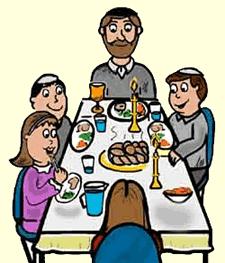The striking contrast in the grandchildren of Abraham may not have been due to a difference in their temperaments, but to mistakes that were made in their upbrining.
Education
As long as they were little, no attention was paid to the latent differences in their natures, both had exactly the same teaching and educational treatment, and the great law of education “educate each child according to his own way,” was forgotten – that each child must be treated differently, with an eye to the slumbering tendencies of his nature.… For strength and courage, no less than brain and lofty thought and fine feelings have their representatives before G-d, and all, in the most varied ways of their callings are to achieve the one great common task of life.
But just because of that, each one must be brought up in the path of life to which his tendencies lead, each one approach the one great goal differently. To try to bring up a Jacob and an Esau in the same college, make them have the same habits and hobbies, want to teach and educate them in the same way for some studious, sedate, meditative life is the surest way to court disaster. A Jacob will, with ever increasing zeal, imbibe knowledge from the well of wisdom and truth, whereas an Esau can hardly wait for the time when he can throw away the old books, and with it, a whole purpose of life, for he has only learnt to know it from one angle, and in a manner for which he can find no relation to his soul.
Had Isaac and Rebecca studied Esau’s nature and character early enough, and asked themselves how can even an Esau—with all that strength and energy, agility and courage that lies slumbering in this child—be won over to be used in the service of G-d, then Jacob and Esau, with their totally different natures could still have remained twin-brothers in spirit and life. Esau’s “sword” and Jacob’s “spirit” could have worked hand in hand, and who can say what a different aspect the whole history of the ages might have presented. But, as it was, only when the boys had grown into men, one was surprised to see that, out of the very same womb, having exactly the same care, training and schooling, two such contrasting person emerge. (R. Shimshon Rafael Hirsch, Commentary on the Torah, Genesis 25:27)
The spirit of man’s heart is evil from his youth. (Genesis 8:21)
Man is born a wild ass. (Job 11:12).
“Educate each child according to his own way, and even when he is old, he will not depart from it.”
It is impossible for a person to change his nature; however, he is free to use his inborn traits in any way that he pleases, whether to become good, evil, or just ordinary. The Talmud states that a person born under the influence of Mars will be inclined to bloodshed, he will become either a mohel (a ritual circumciser), a butcher, or a criminal; for though his inclination is given, he is free to apply it as he chooses, whether for good or for bad. If you teach each child how to serve G-d using his own particular strengths, then even when gets old, he will not leave it. However, if you try to force upon him some foreign mode of behavior, he may listen to you when he is young, out of fear, but when he grows up and becomes independent, he will throw away your mode of life. (R. Eliyahu of Vilna, Mishle, 22:6)
There are two aspects to the task of education. One is to accustom a person from his youth to strive for perfection—in his understanding, his deeds, and his emotions. For the training you give a person when he is young becomes part of his very essence, and will not leave him even in his old age; whereas things a person learns when he is older do not go deep, and will not remain with him as he ages.
On the other hand, every person has different potential, according to his nature. Intellectually, some people have quick minds, whereas others may be slower, yet clearer in their thinking. Each one must be taught according to his nature. Some people are gifted in certain areas of livelihood, and will grasp it quickly. The same is true regarding character traits.
A young person’s natural inclination is recognizable according to his desires, and according to the efforts he himself makes in a given direction, and that is what you must teach him. Then, “even when he is old, he will not depart from it.” That is not the case, however, if you train him in a way which is foreign to him. (Mussar Chochma, (Malbim?), Mishle 22:6)
Everything in the world is drawn after its nature. Thus, even while Jacob and Esau were still in the womb, they were drawn after their tempraments. When Rebecca would walk past a study-hall, Jacob would press to come out, and when she would pass by a temple of idolatry, Esau would struggle to emerge. There were no bad intentions on Esau’s part. He was merely being drawn after his nature. (Maharal of Prague, Gur Ariyeh on Genesis 25:25)
There are psychologists who think that a person is born without any natural inclinations at all, that a child is completely influenced by his surroundings. But that is incorrect. “Sin waits at the door,” the verse says – at the door of the womb. Even a fetus can have an instinct for evil, though he lacks all thought and consciousness. The particular traits of each person are born with him. Of course, the surroundings do have an influence; however one’s main traits are not learned, but inherent. (R. Eliyahu Dessler, Mictav m’Eliyahu, … )
